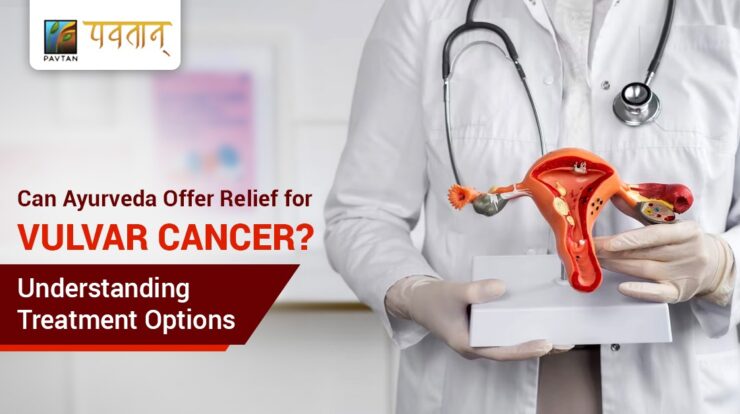
Ayurveda is a traditional Indian system of medicine that has been used for thousands of years to treat various ailments. Ayurvedic remedies can help relieve the symptoms of vulvar cancer by boosting the immune system, reducing inflammation, and promoting overall health and well-being. Through ayurvedic treatment, the blood and cancerous cells in the vulva region are detoxified. Let’s learn more about Vulvar cancer and it can be healed through Ayurvedic treatment.
What is Vulvar Cancer?
The kind of cancer that develops on the outside of the female genitalia is called vulvar carcinoma. The skin around the urethra, vagina, clitoris, and labia is known as the vulva. Typically, vulvar cancer occurs as an itchy bump or sore on the vulva. Vulvar cancer is most typically diagnosed in elderly persons, while it can strike anyone at any age.
What is the Ayurvedic Approach to Cancer Management?
Ayurveda, an ancient Indian holistic healing system, views cancer as an imbalance of the body’s doshas (vata, pitta, and kapha) and aims to restore harmony through lifestyle modifications, herbal remedies, dietary changes, and detoxification practices.
Ayurvedic Treatments for Vulvar Cancer Relief:
Herbal Remedies
Ayurvedic practitioners may recommend specific herbs with anti-cancer properties, such as turmeric (curcumin), ashwagandha, tulsi (holy basil), and neem. These herbs are believed to have immune-boosting and anti-inflammatory effects that may help in cancer management.
Dietary Modifications
Ayurveda emphasizes the importance of a balanced diet to support overall health and healing. Patients with vulvar cancer may benefit from a diet rich in fresh fruits, vegetables, whole grains, and lean proteins while avoiding processed foods, refined sugars, and inflammatory ingredients.
Yoga and Meditation
Stress management techniques like yoga and meditation can play a crucial role in cancer care by promoting relaxation, reducing anxiety, and improving overall well-being. Practices like pranayama (breath control) and mindfulness meditation may help patients cope with the emotional and psychological challenges of cancer treatment.
Detoxification Therapies
Ayurvedic detoxification therapies, such as Panchakarma, aim to eliminate toxins from the body and restore balance to the doshas. These therapies may include procedures like oil massages (abhyanga), herbal steam baths (swedana), and cleansing enemas (basti), which can support the body’s natural detoxification processes.
Lifestyle Recommendations
Ayurveda emphasizes the importance of a healthy lifestyle, including regular exercise, adequate sleep, and stress management practices. Patients are encouraged to cultivate positive habits that promote physical, mental, and emotional well-being.
Integration with Conventional Treatment
It’s essential for patients considering Ayurvedic treatments to consult with both their oncologist and a qualified Ayurvedic practitioner. While Ayurveda can complement conventional cancer treatments by addressing symptoms, improving quality of life, and supporting overall health, it should not be used as a substitute for evidence-based medical care.
Herbal Treatment for Vulvar Cancer
It’s important to note that while some herbal remedies may offer potential benefits in managing symptoms and supporting overall health during cancer treatment, they should not be considered as standalone treatments for vulvar cancer. Herbal remedies should always be used under the guidance of a qualified healthcare professional and integrated into a comprehensive treatment plan that includes conventional medical therapies. Here are some herbs that are commonly suggested for their potential supportive roles:
Tulsi – Tulsi is a powerful antioxidant and may help reduce inflammation and stress in the body caused by vulvar cancer
Sahajana – Sahajana has some anti-cancer qualities. By lowering inflammation and redness in the afflicted area, it aids in treating vulvar cancer.
Giloy – Giloy may have anti-cancer properties due to its immunomodulatory and antioxidant effects.
Atibala – Atibala contains flavonoids, alkaloids, and tannins, among other chemicals, some of which have been demonstrated to have anti-cancer potential.
Ashwagandha – Ashwagandha is an adaptogenic herb traditionally used in Ayurvedic medicine to support the body’s ability to handle stress. It may help in improving energy levels, reducing fatigue, and supporting the immune system during cancer treatment.
Green Tea – Green tea contains compounds called catechins, which have antioxidant properties and may help in protecting cells from damage
Before incorporating any herbal remedies into your treatment plan, consult with your healthcare provider, especially if you are undergoing conventional cancer treatments or taking medications. Additionally, always purchase herbs from reputable sources to ensure quality and purity.
Conclusion
In conclusion, while herbal remedies offer potential supportive roles in managing symptoms and promoting overall well-being during vulvar cancer treatment, they should be approached with caution and used under the guidance of a qualified healthcare professional. Vulvar cancer, though rare, requires comprehensive treatment strategies that often include surgery, chemotherapy, radiation therapy, and targeted therapies. It’s crucial for patients to make informed decisions in collaboration with their healthcare providers to optimize their treatment outcomes and quality of life.
